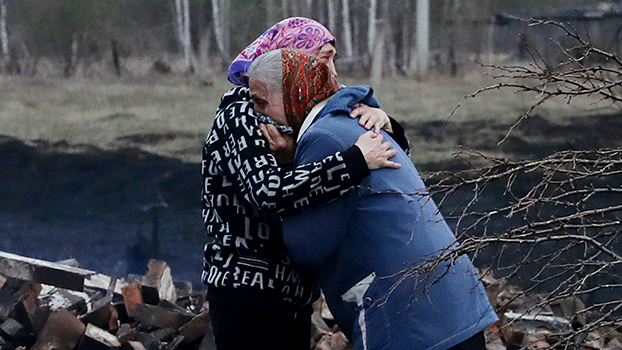
The climate crisis continues unabated—with or without the coronavirus. The current year has the potential to become one of the five hottest, if not the hottest since weather records began.
Nadja Charaby works as head of the International Politics and North America Unit and a senior advisor for Climate Policy at the Rosa-Luxemburg-Stiftung in Berlin. This article first appeared in maldekstra #8 and was translated by Nathan French.
Siberia is currently being hit by an extreme, continuous heat wave. The tundra is burning, which caused the emission of 56 megatons of CO2 in June alone. The melting permafrost is already causing the collapse of infrastructure, including oil pipelines, and increasing the risk of methane gas escaping—a much more aggressive climate killer than CO2. In July 2020, Arctic ice had shrunk by 330,000 square kilometres compared to the last seasonal record low of nine years ago—an area almost as large as Germany. It’s also not over with the swarms of locusts that afflicted eastern Africa, parts of the Arabian Peninsula, South Asia, and South America at the beginning of this year. The locusts are back, while heavy rainfall and flooding from March to May led to the displacement of several hundred thousand people in East Africa.
In addition, there is now COVID-19, which in many places is bringing healthcare systems to a standstill. Demands such as washing hands and staying at home are minor in light of this situation. Perhaps it is the past few days of excessive heat and dryness that remind us that we have not left the climate crisis behind and that we are far from overcoming it. The supposed easing of the emissions situation through less air travel and reduced industrial productivity does not even give us a short breather, let alone bring about the necessary system change that we so urgently need.
Corona has put a damper on the mobilization of the various climate movements. International climate diplomacy came to a virtual standstill in 2020 with the suspension of climate negotiations due to pandemic-related restrictions. Although the 26th UN Climate Conference will be held in 2021, in view of the devastating effects of the climate crisis, 2020 is now a lost year—if there is any hope at all that the UN climate process will make a relevant contribution to saving the world’s climate.
The pushing back of the climate conference also takes away a political moment this year, which would have brought the global climate movement together and provided an opportunity to bring protest back to the streets and into public awareness. The impressive images from 2019 with millions of young people in particular on the streets calling for more climate justice worldwide have been displaced by the coverage of COVID-19. Although there were protests in Germany after the passing of the so-called coal phase-out law, they remained far from what we could have experienced in 2019.
Many activists, scientists, and other social actors who have been providing facts for years, struggling to make the necessary governmental decisions, and building up social pressure for states to finally take appropriate action for the climate, are likely to have mixed feelings about the suddenly possible interventions in the context of the corona crisis. Isn’t it surprising that in dealing with the climate crisis, necessary reforms are being denied with reference to economic interests, the need to economize, and the market’s supposed claims to development, while the corona crisis has shown, with the rapid mobilization of state welfare measures and interventions, that there is actually another way? Hasn’t dealing with the pandemic also shown that close cooperation between science and politics can contribute to successful crisis management? Does this mean that government decision-makers have finally understood that this also makes sense when it comes to climate issues?
To learn lessons from the handling of corona to overcome the climate crisis seems reasonable. But at the same time, it will not be enough just to turn a few smalls screws. The central question will be how to cope with the corona crisis, whether it is primarily national economic interests, whether it is a pure, possibly green-painted focus on growth—or whether a turning away from capitalist market logics, neo-colonial trade agreements, the externalization of social and ecological costs of prosperity in the Global North to the Global South can now unite social majorities behind it.
For the last 25 years, we’ve known only too well that our multilateral system is not sufficiently capable to deal with the global crises of our time. In the case of corona, the crisis of multilateralism has once again been demonstrated in its full explosiveness. What about a serious left-wing project here that thinks our ideas in the United Nations through to the end and takes them forward together with our allies? The climate and the global right to health would benefit. One way or another: preparations for the next climate demonstrations and the next global climate protest will of course continue to be needed. And blockades of fossil infrastructure projects will also work if hygiene rules are observed.